
The Ministry of Environment, Forest and Climate Change (MoEF&CC), Government of India envisages to celebrate the World Environment Day 2023 with a thrust on the Mission LiFE. The concept of LiFE, introduced by the Hon’ble Prime Minister of India, aims to promote sustainable living by encouraging individuals to make changes in their lifestyles and emphasizes responsible and conscious use of resources to safeguard and conserve the environment.
To generate widespread awareness and advocacy for LiFE across India, a month-long mass mobilization campaign on Mission LiFE is currently underway. Following the “whole of government” and “whole of society” approach, the Ministry has mobilized Central Ministries/ Departments, State/ UT Governments/ Administrations, Institutions, and private organizations to spread the message of Mission LiFE. The ongoing mass mobilization campaign aims to amplify pan-India advocacy and awareness about LiFE, leading up to celebration on World Environment Day on 5th June 2023.
- Zoological Survey of India
Zoological Survey of India, Kolkata organised an awareness drive in Central Academy of Forest Education (CAFE), St Mary’s Hill, Kurseong, West Bengal in which about 20 staff and local people were made aware of Mission LiFE. The staff were explained how plastics are harmful for the fragile environment and they should go for rain water harvesting to save water for use in the winter and dry season. Pledge was taken by all.
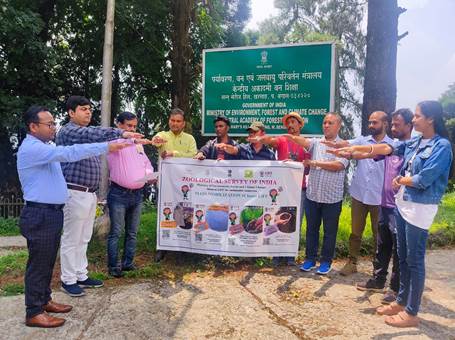
Zoological Survey of India, Canning, West Bengal organized an awareness drive at ZSI Office with school students from Canning town. 40 students took part and pledge was taken by all. The students were all appraised of the objectives of Mission LiFE and that they should all spread awareness among locals to save the environment.
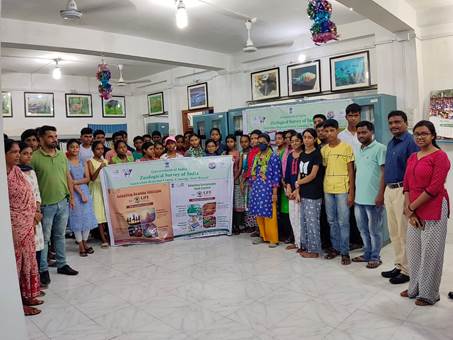
To promote the objectives of Mission LiFE, Zoological Survey of India, Canning, West Bengal and Central Soil Saline Research Institute, Sundarbans jointly organized training programs entitled “Paddy cultivation in saline water” at Ramgopalpur, Gadkhali with 50 farmers. The farmers took part and pledge was taken by all.
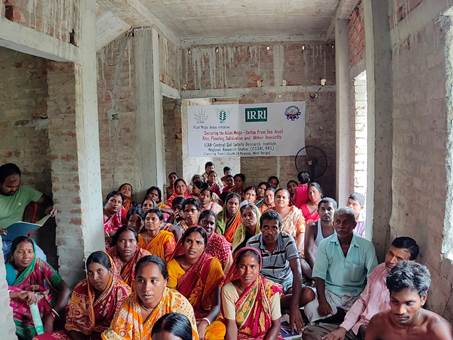
Zoological Survey of India, Canning, West Bengal conducted an awareness drive at Kalidanga village, Sundarbans with 55 children and general public. Pledge was taken by all.
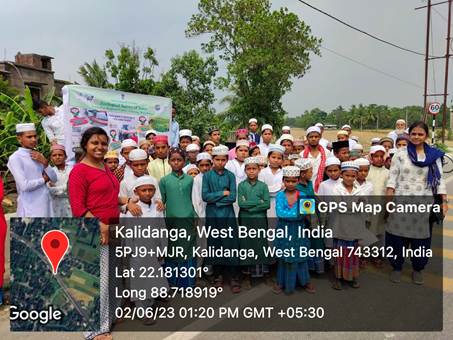
Zoological Survey of India, Arunachal Pradesh Regional Centre, Itanagar conducted Mission LiFE Awareness Program at Raj Bhawan, Itanagar, Arunachal Pradesh on 01.06.2023 where Hon’ble Governor of Arunachal Pradesh chaired as the Chief Guest. 300 people participated in the function. LiFE Pledge was administered by the Hon’ble Governor of Arunachal Pradesh to all present on the occasion.
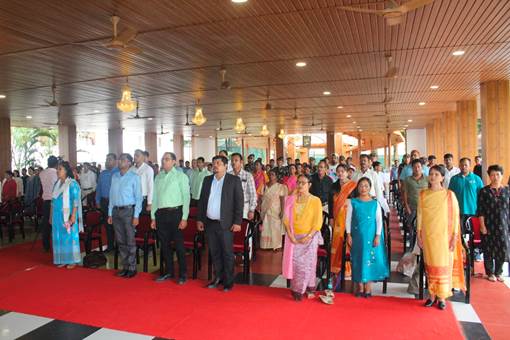
- GB Pant National Institute of Himalayan Environment
Centre for Land and Water Resource Management (CLWRM) of G.B. Pant National Institute of Himalayan Environment (NIHE) conducted an awareness and plantation cum action drive under mission LiFE at Koormanchal Academy, Kosi, Almora, Uttarakhand on 02nd June 2023. A total of 120 participants participated in the program that included the school teachers, students, researchers and faculties of NIHE. The participants were sensitized on all the seven themes of mission LiFE to save water, save energy, reduce waste, etc. A plantation drive of important plant species contributing to the rejuvenation of water bodies was also carried out with the teachers of the academy at the School premises. Furthermore, a demonstration session on water quality assessment using scientific measures was also organized. All the participants took LiFE pledge to adopt environment-friendly habits.
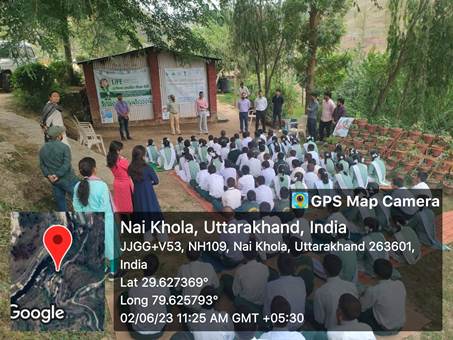
Centre for Land and Water Resource Management (CLWRM) of G.B. Pant National Institute of Himalayan Environment (NIHE) conducted an awareness program under mission LiFE at Government Inter College Digalichaur, Lohaghat, Champawat, Uttarakhand. The participants were aware on the different themes of the mission LiFE viz. Save Water, Adopt Healthy Lifestyles, Reduce Waste, and Adopt Sustainable Food Systems. A total of 464 participants including students and teachers of GIC Digalichaur, and researchers of CLWRM-NIHE participated in the program and also took the LiFE pledge.
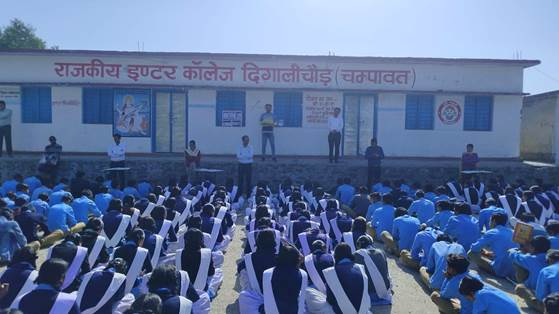
Garhwal Regional Centre of the NIHE conducted an awareness program, under the ‘Adopt healthy lifestyle’ and ‘Say no to Single Use Plastic’ themes of mission LiFE at Mangsu village, Tehri Garhwal. A total of 72 stakeholders participated in the program and took the LiFE Pledge ‘Lifestyle for the Environment to adopt environment-friendly habits. At the end of the program, multi-purpose trees were distributed to the villagers to promote biodiversity and a healthy lifestyle.
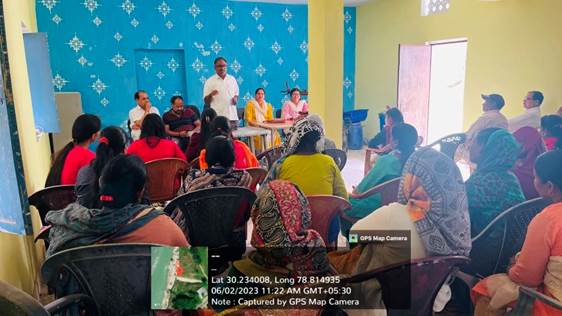
Himachal Regional Centre (HRC) of NIHE organized an Awareness program and cleanliness drive program on 02/06/2023 at Mahila Mandal Dal, Bhutti Colony, Kullu under the ‘Reduce Waste’ theme of Mission Life. A total of 28 participants including faculty, researchers, and member of the Mahila Mandal participated in the program & and were sensitized to the various effective measures to reduce waste. All the participants also pledged to reduce waste to adopt an environment-friendly lifestyle.
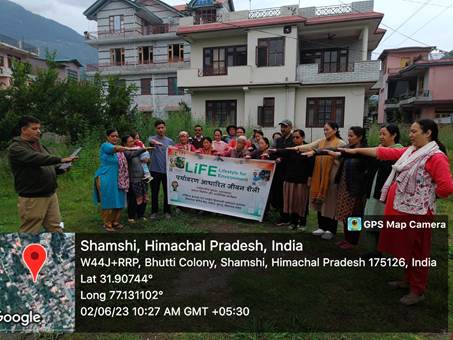
Sikkim Regional Centre (SRC) of NIHE organized awareness and action events under mission LiFE. The program was organized with the tourists at Bagthang Falls, Gangtok on 02nd June 2023. More than 45 tourists and shopkeepers took the LiFE pledge and committed to adopting eco-friendly actions in their daily life. During the program, a total of 16 actions of mission LiFE under 06 themes viz. save energy, save water, adopt sustainable food systems, adopt healthy lifestyles, say no to single-use plastic, and reduce waste were covered. Also, as an action, several eco-friendly practices along with solid waste management initiatives of Sikkim were shared with tourists.
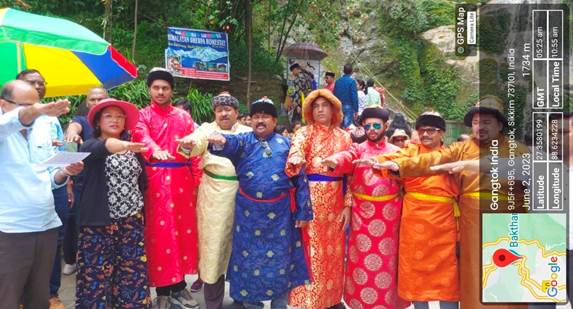
The North-East Regional Centre (NERC) of NIHE organized an awareness program around Grace Church and Gompa temple. A total of 31 tourists and locals were sensitized about the importance of mission life through one-to-one interaction and discussion. In another event, the NERC of the Institute conducted an awareness and action activity under mission LiFE in Chandranagar Daily Market, Itanagar. The Shopkeepers and customers were sensitized about the impacts of single-use plastic, and waste on the environment. To reduce the use of plastic carry bags and promote eco-friendly bags, 25 cloth-made shopping bags were distributed to all the marketgoers and shopkeepers in the daily market. The participants took LiFE pledge to sustain the natural resources in Arunachal Pradesh and to contribute to environmental conservation. Scientists, researchers, and other office staff participated in one-to-one interaction with tourists as well as locals and fostered the “adapting healthy lifestyle”.
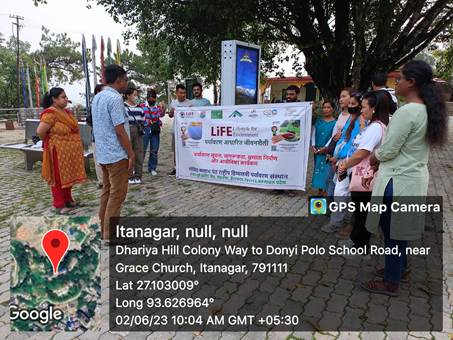
Centre for Socio-economic Development (CSED) of NIHE conducted an awareness and action cum cleanliness drive on 2nd June 2023 under mission LiFE. The locals were also sensitized to stop the use of single-use plastic and contribute to keep water resources clean to adopt healthy lifestyles. The cleanliness drive was conducted on the roadside and near the Kosi-river bridge, Almora, Uttarakhand. A total of 20 participants including faculties, researchers, and support staff of CSED participated in the event and also took the LiFE pledge.
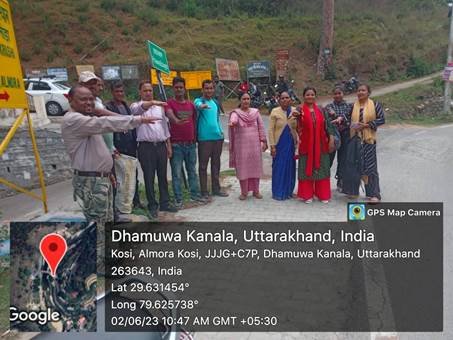
Centre for Environmental Assessment & Climate Change (CEA&CC) of NIHE organized a consultative cum brainstorming workshop on ‘Innovative approaches for Waste Management’ under “Mission Lifestyle for Environment (LiFE)” at NIHE, Almora, to foster the ‘Adopt Healthy Lifestyles’. Dr. Achalesh Daverey, Sr. Asst., Professor from Doon University enlightened the participants on pine needle-based biochar for wastewater treatment and Anammox bacteria for the management of constructed wetlands. A total of 28 participants participated in the program and took the LiFE pledge to sustain the natural resources in the Indian Himalayan region (IHR) and to contribute to soil and water conservation. In another event, a consultative cum brainstorming workshop on ‘Water management and DRR’ under “Mission Lifestyle for Environment (LiFE)” on 02nd June 2023 near Kosa village, Joshimath, Chamoli, Uttarakhand, to foster the “Adopting Healthy Lifestyles”. A total of 43 participants participated in the program and took the LiFE pledge. Another event was organized near Papoli village, Almora, Uttarakhand, to foster the “Adopting Healthy & Sustainable Lifestyles”. A Total of 48 participants planted nearly 100 plants of Baanj, Devdar, Uttis, Thuja, Ginkgo, and Manipuri Baanj in and around the temple area and panchayat ghar. All the participants took the LiFE pledge to sustain the natural resources in the Indian Himalayan region (IHR) and to contribute to soil and water conservation.
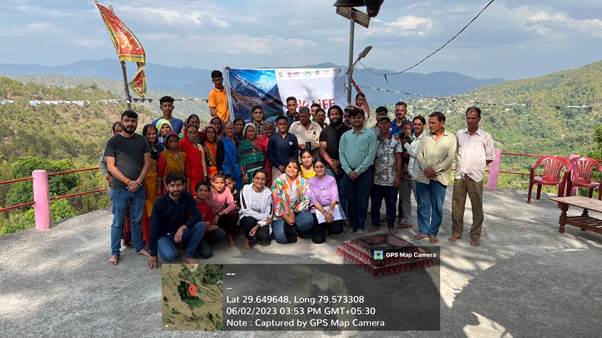
- National Centre for Sustainable Coastal Management
As part of the mass mobilisation Mission LiFE, NCSCM organised an outreach event at the Devi River mouth, to ensure people’s participation (Jan Bhagidari) in coastal and marine conservation. Devi Beach is one of the landscapes in Odisha’s Puri and Jagtsinghpur districts. It is a tributary of the Mahanadi River, lies within the Mahanadi Basin, and is known for its diverse biodiversity. Every year, thousands of visitors come to enjoy the calm surroundings, golden sandy beach, and lush greenery. Because of its various habitats and the ecological services they provide, the estuary is of great ecological value. Mangroves characterise the estuary area and serve an important role in coastal protection, reducing erosion, and providing a nursery for many marine animals. Mangroves, sand dunes, and estuarine environments provide niches for a variety of plants and animals. These beaches host “arribadas,” or mass nesting occasions, in which thousands of female Olive Ridley turtles come ashore to lay their eggs. These diversified ecosystems support a wide range of migratory birds, fish, crabs, and other marine animals. Local communities depend on these resources for sustenance and livelihoods, making their conservation vital.
NCSCM scientists sensitised around 75 tourists on the themes of Mission LiFE to encourage people to engage in small, everyday actions that can have a significant positive impact on their lives and their environment. The event provided tourists with a quick introduction to the ecologically sensitive coastal ecosystems and the need to conserve them by avoiding “trampling” and “littering”. They also stressed the importance of community participation in ongoing MISHTI initiatives, conservation and restoration of mangroves, and organising frequent clean-up activities to decrease the lotic entry of plastic into rivers, which is crucial for the health of coastal and marine ecosystems. Marine litter poses a great threat to the turtle population, as turtles often mistake plastic bags and other debris as part of their diet, which leads to serious health problems or even the death of these endangered species. The NCSCM scientists sensitised the fishing community about not operating trawler boats for fishing near the turtle nesting sites to prevent entangling and injuring (e.g., clipping off flippers) turtles and encouraged the use of Turtle Excluder Devices (TEDs) to exclude turtles from getting captured and the retrieval of ghost nets. Turtle egg protection measures and the establishment of hatcheries have been suggested for the highly vulnerable turtle breeding sites, which are susceptible to disturbances, poaching, and predation. These initiatives focused on highlighting the ecological importance of turtles and their conservation status, not indulging in using bright flashlights during the breeding season. Raising awareness among beachgoers, tourists, shop owners, and beach vendors, beach operators on the various ecosystem services provided by the beaches and placing further emphasis on reducing litter generation in everyday life is the most significant step towards positive environmental gains. The scientists underlined the need to follow the litter minimization hierarchy (reduce, reuse, recycle, recovery, and disposal) for their daily litter footprint. Additionally, NCSCM scientists sensitised tourists, local vendors, and representatives of the fishing community on their important role in sustainable management of backwater tourism, wetland conservation, and the need to live in harmony with nature. As a part of the event, participants took LiFE’s pledge to stop littering and to live a green and sustainable life. Posters and pamphlets were distributed on the beach as part of this event, and employees emphasised the significance of Mission LIFE to the public.
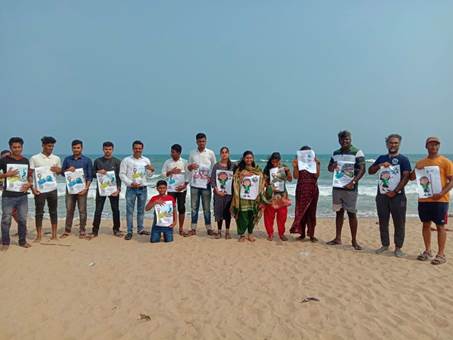
Lakshadweep is a Union Territory of India located in the Arabian Sea. It is a group of 36 islands, of which only 10 are inhabited. The economy of Lakshadweep is primarily based on agriculture, fisheries, and tourism. Coconut cultivation is the main agricultural activity, and it is a major source of income for the local population. Fishing is another important economic activity, with the islands known for their rich marine resources. In recent years, tourism has gained significance, attracting visitors with its pristine beaches and coral reefs. The islands host a variety of marine species, including corals, fish, turtles, and dolphins, and are a significant breeding ground for various species of seabirds. Like many other coastal areas, Lakshadweep faces environmental challenges such as coastal erosion, rising sea levels, and the impact of climate change. These factors pose threats to the islands’ ecosystems, infrastructure, and the livelihoods of the local population. The coir industry, as a coconut tree-based industry, holds socio-economic significance on the island by providing employment, contributing to the local economy, preserving cultural heritage, and offering sustainable livelihood opportunities. It is a labour-intensive industry, and many local residents, especially women, are engaged in coir-related activities. Traditional coir-making techniques have been passed down through generations and are part of the local heritage. The coir industry plays a role in preserving cultural practices and connecting communities with their traditional roots.
On the awareness front, NCSCM scientists sensitised nearly 25 representatives of the coir industry workers and officials about the themes of Mission LiFE, energy and biodiversity conservation, sustainable food practises, and adopting a sustainable lifestyle. Scientists emphasised the necessity of reducing single-use plastics in sensitive island ecosystems using eco-friendly alternatives, water conservation, energy conservation, and biodiversity conservation. They underlined that by using coir products, we can reduce reliance on single-use plastics, promote sustainability, and contribute to environmental conservation. NCSCM staff highlighted the need to use coir geotextiles as an erosion control measure, since most of the island is under threat from coastal erosion. These products help stabilize soil, control sediment runoff, and promote vegetation growth. Scientists, in their discussion with coir workers, also highlighted the need for value added products from the coir fibre, such as coir pots for seedlings and plant nurseries. Further, they discussed the use of coir mulch in gardening and landscaping as an alternative to plastic mulch. As part of this event, the participants undertook the LiFE pledge and the signature campaign in support of the LiFE mission.
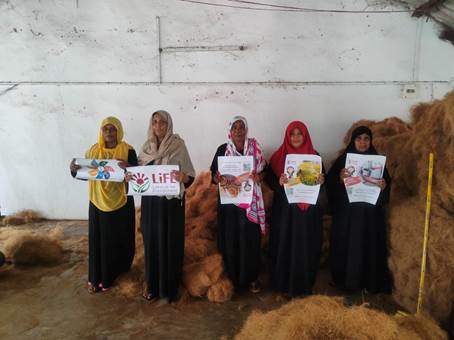
- Botanical Survey of India
Mission LiFE campaign at Se Sec School Doodha Matiyana, Sirmaur District. Awareness generated among about 95 students and 10 school staff members to save natural resources and to adopt healthy lifestyle for environment.
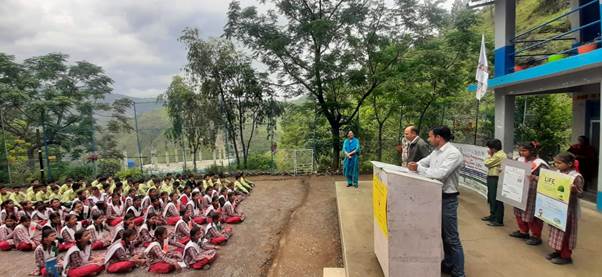
- Environment Education Programme (EEP)
Various Eco-clubs under Environment Education Programme (EEP) organized 1217 events for promotion of Mission LiFE with participation of more than 56,000 children on June 2, 2023. More than 54,000 LiFE pledges also were taken during the day’s events.
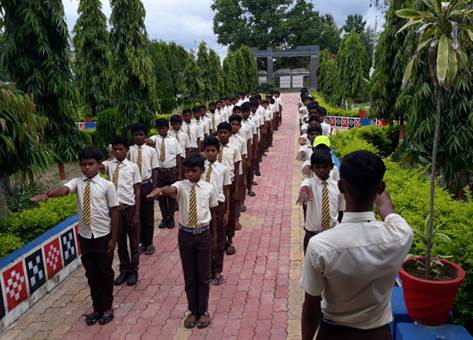
LiFE pledge event was organized in various schools of Odisha during the day.
Following the traditional eco-friendly method of decoration, GVHS Cherizheekal, Kerala used braided kuruthola toranam made from coconut leaves avoiding plastic decorations during the school reopening festival 2023-24. Ecoclub members introduced the making of kuruthola toranam to other students also.
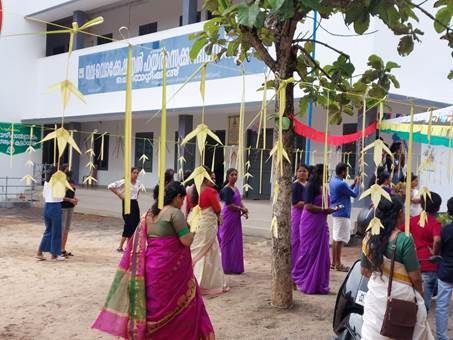
Another school – GHS Valavayal, Kerala welcomed the students to the new academic year with leaf badges.
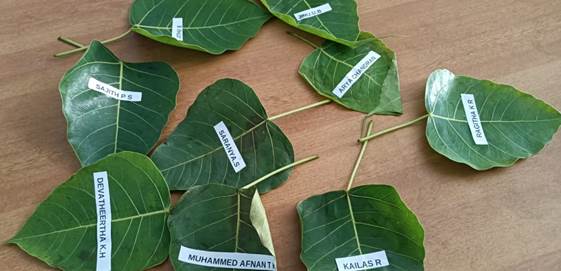
Demonstration of solar panel to students was organized at Govt. SBN College building, Barwani, Madhya Pradesh to sensitize students on the theme Save Energy.

Cocopeat making workshop was organized by the Eco Club master trainer, Ratlam, Madhya Pradesh. LiFE pledge was also taken by the participants.
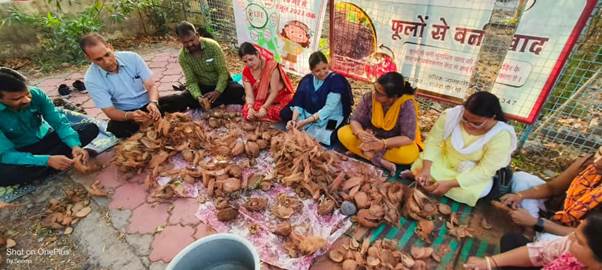
In a run to WED, Eco-club schools of Sikkim engaging 500+ students took active part in Mission LiFE propagation and awareness. Activities include awareness on Mission LiFE by SNA officers at select schools, morning assembly sensitization, painting competition and extempo quiz competition during morning assembly.
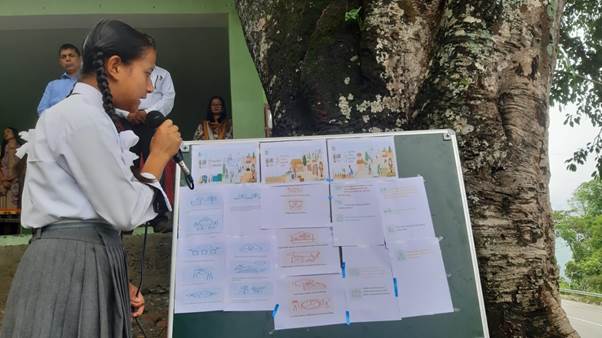
- Environmental Information, Awareness, Capacity Building and Livelihood Programme (EIACP):
The Environmental Information, Awareness, Capacity Building and Livelihood Programme (EIACP) is a Central Sector sub-scheme aligned with the Mission LiFE initiative. The program is dedicated to raising awareness, building capacity, and promoting sustainable actions among individuals and communities across India. By focusing on education and empowerment, the EIACP aims to drive positive change and foster a sustainable future for all.
On Friday, 2nd June, 2023, the EIACP Programme Centres conducted a series of activities as part of a mass awareness campaign on Mission LiFE leading up to the World Environment Day 2023 celebrations. More than 18 activities and over 2300 participants took part in various events organised by EIACP Centres across India. EIACP Programme Centre at CECB, Raipur created a world record by taking a LiFE pledge of over 12.38 lakh by the people to conserve the environment. The programme was organised by the EIACP PC Hub at Chhattisgarh Environment Protection Board under the Mission LiFE programme on June 1, 2023 from 8 am to 5 pm. This was an innovative initiative of EIACP, CECB, Raipur, to bring awareness through public participation.
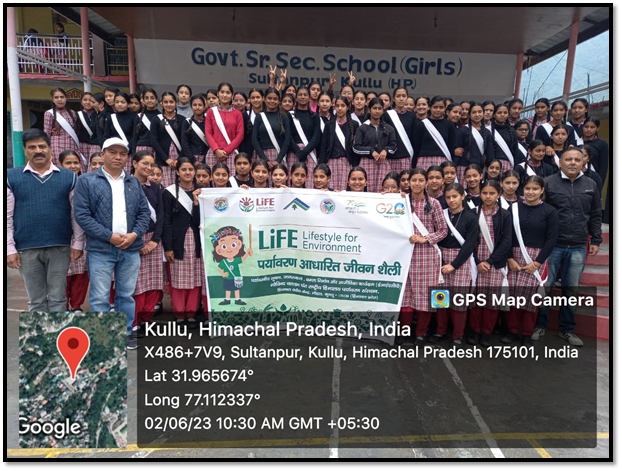
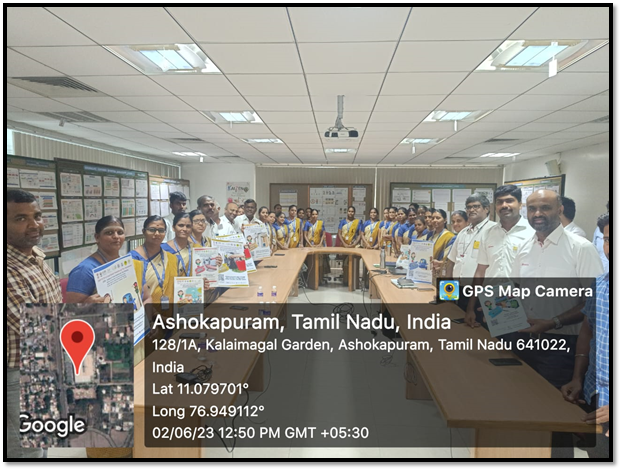
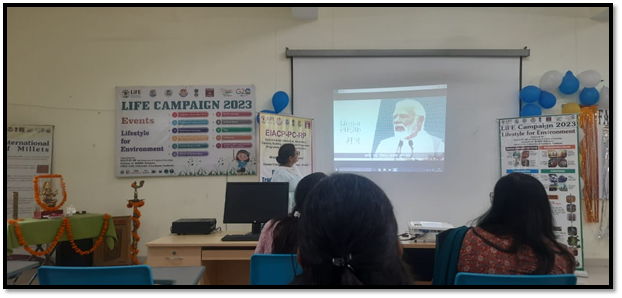
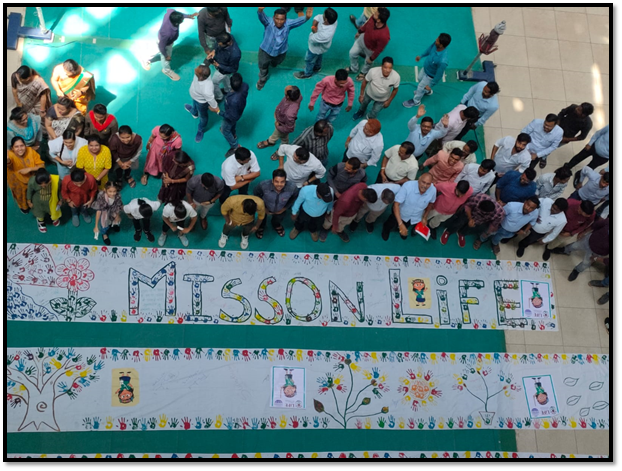
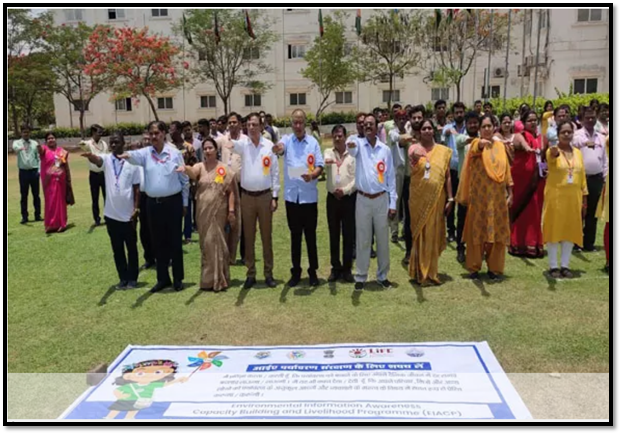
************
MJPS

